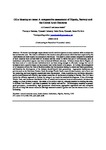Oil a blessing or curse: A comparative assessment of Nigeria, Norway and the United Arab Emirates
| dc.contributor.author | Elwerfelli, A | |
| dc.contributor.author | Benhin, James | |
| dc.date.accessioned | 2018-04-13T14:16:12Z | |
| dc.date.issued | 2018-04-20 | |
| dc.identifier.issn | 2162-2078 | |
| dc.identifier.issn | 2162-2086 | |
| dc.identifier.uri | http://hdl.handle.net/10026.1/11272 | |
| dc.description.abstract |
Oil booms have brought unprecedented wealth and development to some countries while in others this has not been the case. The latter is attributed to the resource curse phenomenon which has been explained by the Dutch disease and more recently by poor quality institutions. This paper is a three country comparative assessment of how countries have utilised their oil revenues and the extent to which key policy environments, such as institutional and political aspects, may have influenced different outcomes. Evidence shows that in Nigeria, oil has been more of a curse because institutions have not been strong enough to efficiently manage the vast oil revenue to have a positive impact on the economy and for the benefit of its people. In Norway, the management of oil resources reflects the view of decision makers that the resources belong to current and future generations, and therefore the development of the industry should benefit both generations. Appropriate institutions and policies such as the Petroleum Pension Fund, Sovereign Wealth Fund, a more diverse economy and a fiscal rule for controlling, and more targeted, expenditures were implemented. These, in addition, to a very stable democratic political environment and effective legal system meant that oil has become a blessing to Norway. The UAE has a similar but different approach to Norway, by using oil as a basis for sustained development. It has a Sovereign Wealth Fund, and focuses on distribution of the oil-wealth and investment in social and economic infrastructure leading to a more diverse economy. The nature of its political stability, although essential to avoiding the curse, is different from Norway’s and there is potential for tension and conflict. For developing countries in general, good governance, accountability, high government effectiveness, appropriate regulations and anti-corruption policies will help link natural resources with high sustained economic growth and turn the resource from a curse to blessing. | |
| dc.format.extent | 1136-1160 | |
| dc.language.iso | en | |
| dc.publisher | Scientific Research Publishing | |
| dc.subject | Generic health relevance | |
| dc.subject | 16 Peace, Justice and Strong Institutions | |
| dc.title | Oil a blessing or curse: A comparative assessment of Nigeria, Norway and the United Arab Emirates | |
| dc.type | journal-article | |
| plymouth.issue | 05 | |
| plymouth.volume | 08 | |
| plymouth.publication-status | Published | |
| plymouth.journal | Theoretical Economics Letters | |
| dc.identifier.doi | 10.4236/tel.2018.85076 | |
| plymouth.organisational-group | /Plymouth | |
| plymouth.organisational-group | /Plymouth/Faculty of Arts, Humanities and Business | |
| plymouth.organisational-group | /Plymouth/Faculty of Arts, Humanities and Business/Plymouth Business School | |
| plymouth.organisational-group | /Plymouth/Faculty of Arts, Humanities and Business/Plymouth Business School/PBS - Manual | |
| plymouth.organisational-group | /Plymouth/PRIMaRE Publications | |
| plymouth.organisational-group | /Plymouth/REF 2021 Researchers by UoA | |
| plymouth.organisational-group | /Plymouth/REF 2021 Researchers by UoA/UoA17 Business and Management Studies | |
| plymouth.organisational-group | /Plymouth/Research Groups | |
| plymouth.organisational-group | /Plymouth/Research Groups/Marine Institute | |
| plymouth.organisational-group | /Plymouth/Users by role | |
| plymouth.organisational-group | /Plymouth/Users by role/Academics | |
| dcterms.dateAccepted | 2018-04-17 | |
| dc.rights.embargodate | 2019-12-18 | |
| dc.identifier.eissn | 2162-2086 | |
| dc.rights.embargoperiod | Not known | |
| rioxxterms.versionofrecord | 10.4236/tel.2018.85076 | |
| rioxxterms.licenseref.uri | http://www.rioxx.net/licenses/all-rights-reserved | |
| rioxxterms.licenseref.startdate | 2018-04-20 | |
| rioxxterms.type | Journal Article/Review |


